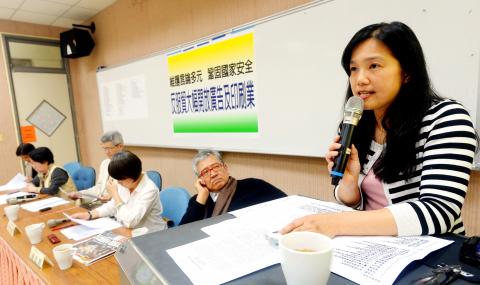More than 1,000 academics and workers in the cultural sector signed a petition launched by communication academics to protest against the cross-strait service trade agreement, which would allow Chinese investment in the nation’s printing and advertising industries.
The petition has garnered more than a thousand signatures within two days of its launch, with National Taiwan University’s Graduate Institute of Journalism director Hung Chen-ling (洪貞玲), National Chengchi University’s Department of Journalism chair Lin Yuan-huei (林元輝), National Taiwan Normal University’s Graduate Institute of Mass Communication director Kelly Hu (胡綺珍), National Chengchi University’s Department of Radio & Television chair Hsu Chiung-wen (許瓊文), Shih Hsin University’s Department of Journalism chair Hu Guang-shiash (胡光夏) and many professors from various universities’ communication-related departments among the petition’s initiators.
“As everybody knows, the media is directly and indirectly affected by the advertising industry, and freedom of speech is closely related to the publishing, printing, releasing and retailing industries,” Hung said at the press conference yesterday.

Photo: Lin Cheng-kung, Taipei Times
It is also common sense that the signing of a free-trade agreement should not pose risks to national security, she added.
“As cross-strait exchanges have become more frequent, a fact needs to be kept in mind: Taiwan and China are still to an extent adversaries, hostile to each other and therefore exchanges between the two can pose security risks,” the petition said.
“As China continues to be a (post-)authoritarian country that employs strict censorship and limits freedom of expression, a service trade pact that liberalizes Chinese investment in publishing-related industries without undertaking comprehensive assessments on the impact on Taiwan’s related industries and freedom of speech would detrimentally threaten Taiwan’s vibrant, plural, democratic and free environment,” it said.
One of the petition’s initiators is former Presidential Office national policy adviser Rex How (郝明義), who is also a publisher.
At the press conference, How criticized Minister of Culture Lung Ying-tai’s (龍應台) recent remarks about the pact not affecting the publishing industry because Chinese investment is “only allowed in the printing industry.”
“The relationship between printing, releasing, retailing and publishing as upstream and downstream industries can be paralleled to shoulders, arms, wrists and hands. Can you insist that your hands are not touched when your shoulders, arms and wrists have all been given away?” How asked.
Hu Yuan-hui (胡元輝), an associate professor at National Chung Cheng University’s Department of Communication, described the service trade pact as a “Faustian bargain,” saying that China’s influence on publishing-related industries was not aimed at economic gains, but at permeating every corner of the country with Chinese information.
Laurent Shen (沈志儒), creative director of Moulin-Orange (橘子磨坊), a company operating in the advertising industry, said that “Taiwan is not free anymore,” adding that in the signature collection campaign in support of the Sunflower movement within the industry, many working in the field were “only willing to support in private due pressure from you-know-what.”
He said Taiwan’s advertising industry is not afraid of international competition, but of “a liberalization and competition that forces the forfeiture of free consciousness.”

Taipei has once again made it to the top 100 in Oxford Economics’ Global Cities Index 2025 report, moving up five places from last year to 60. The annual index, which was published last month, evaluated 1,000 of the most populated metropolises based on five indices — economics, human capital, quality of life, environment and governance. New York maintained its top spot this year, placing first in the economics index thanks to the strength of its vibrant financial industry and economic stability. Taipei ranked 263rd in economics, 44th in human capital, 15th in quality of life, 284th for environment and 75th in governance,

Greenpeace yesterday said that it is to appeal a decision last month by the Taipei High Administrative Court to dismiss its 2021 lawsuit against the Ministry of Economic Affairs over “loose” regulations governing major corporate electricity consumers. The climate-related lawsuit — the first of its kind in Taiwan — sought to require the government to enforce higher green energy thresholds on major corporations to reduce emissions in light of climate change and an uptick in extreme weather. The suit, filed by Greenpeace East Asia, the Environmental Jurists Association and four individual plaintiffs, was dismissed on May 8 following four years of litigation. The

A former officer in China’s People’s Liberation Army (PLA) who witnessed the aftermath of the 1989 Tiananmen Square massacre has warned that Taiwan could face a similar fate if China attempts to unify the country by force. Li Xiaoming (李曉明), who was deployed to Beijing as a junior officer during the crackdown, said Taiwanese people should study the massacre carefully, because it offers a glimpse of what Beijing is willing to do to suppress dissent. “What happened in Tiananmen Square could happen in Taiwan too,” Li told CNA in a May 22 interview, ahead of the massacre’s 36th anniversary. “If Taiwanese students or

The New Taipei City Government would assist relatives of those killed or injured in last month’s car-ramming incident in Sansia District (三峽) to secure compensation, Mayor Hou You-yi (侯友宜) said yesterday, two days after the driver died in a hospital. “The city government will do its best to help the relatives of the car crash incident seek compensation,” Hou said. The mayor also said that the city’s Legal Affairs, Education and Social Welfare departments have established a joint mechanism to “provide coordinated assistance” to victims and their families. Three people were killed and 12 injured when a car plowed into schoolchildren and their